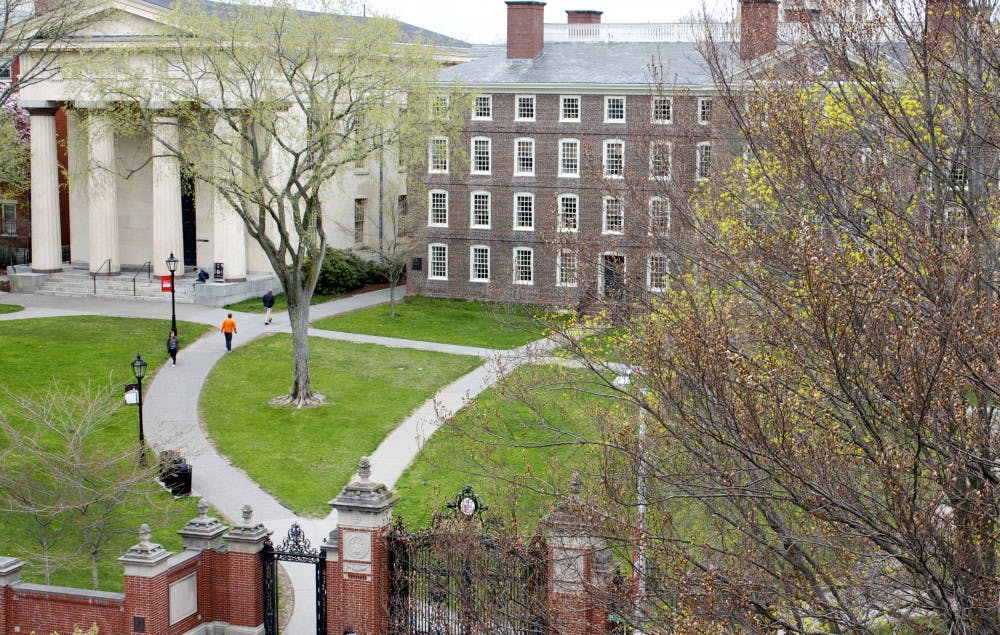Updated Oct. 14, 2016 at 8:50 a.m.
A former student, identified as Jane Doe in court documents, is suing the University with allegations that the investigations into her sexual assault case were improperly handled, the Associated Press reported.
The case surrounds an Oct. 17, 2014 incident in which two female students attended a party at the Phi Kappa Psi fraternity house, where they allege they received drinks spiked with the date-rape drug GHB, The Herald previously reported. One of the two students also reported being sexually assaulted after leaving the party.
Doe identifies the student who spiked her drink as the son of a trustee of the University. Doe is also suing the student who spiked her drink — referred to as John Smith in court documents — and both Phi Kappa Psi, Inc. and its Rhode Island chapter. Those close to the case, including Doe’s father, have raised suspicions that the University protected the accused during investigations, The Herald previously reported.
“We can’t comment on individuals, (but) we categorically reject any suggestion that a student’s family connections are ever a factor in our consideration of student conduct cases,” wrote Brian Clark, director of news and editorial development, in an email to The Herald.
After bringing the case to the attention of University authorities, Doe submitted blood, urine and hair samples for investigation. Though the urine sample was originally determined to test positive for the drug GHB, it was later deemed inconclusive after the University hired an independent expert to review the test results.
Hair samples that Doe provided were studied by an independent company and were found to be inconclusive for evidence of the drug. But this interpretation was called into question because the lab’s work for the University in the past has been called unreliable and misleading by multiple news outlets, The Herald previously reported.
The University held three disciplinary hearings: one for Phi Kappa Psi, one for the student accused of drugging her and one for the student accused of sexually assaulting her. In the hearing for the student accused of sexually assaulting her — referred to as Michael Jones in court documents — the University reached a ruling of not responsible given that Doe’s partial memory of the incident was not considered sufficient to counter Jones’ claim that she provided consent.
Doe claims the Student Conduct Board, which assessed the case, “put the burden on Ms. Doe to have consumed just enough of the date-rape drug to both have exhibited obvious symptoms of incapacitation and to remember having exhibited those symptoms; Ms. Doe’s incapacitation was used against her,” according to court documents.
Due to lack of physical evidence, the University eventually dropped the investigation and disciplinary charges against the trustee’s son.
Doe claims that forensic toxicologists “readily acknowledge that conclusive evidence of drugging is rarely obtained in cases of drug-facilitated sexual assault,” and therefore dropping the case due to a lack of evidence “is a deviation from the standard of care,” according to the court documents.
Phi Kappa Psi was originally suspended for four years, though the sanction was later reduced to allow the fraternity to petition the University for recognition after only two years, The Herald previously reported.
“The University is confident in the integrity of the process and the decisions that were made,” Clark wrote.
The case also claims that Phi Kappa Psi has continued to hold unauthorized events during its sanctions — including rush events — against which “the University failed to take effective corrective measures or take any further disciplinary action,” according to court documents.
Doe’s case brings four charges against the University, including the allegations that the University violated Title IX by discriminating against her because of her sex, exhibited negligence and violated Rhode Island law. A fourth request for relief is in regard to retaliation against Doe, which is also in violation of Title IX, according to court documents.
After the very public disciplinary hearings, Doe claims that she was denied an interview with the Alpert Medical School despite receiving interviews from more highly ranked medical schools such as those of Harvard and Stanford University.
Doe’s lawyer, Miriam Weizenbaum, also argues in court documents that “University officials refused to accept documentary evidence” demonstrating that Smith ran a fake ID business out of his University mailbox called “I’m 22 Bitch.”
The case also brings to light several details regarding the University’s handling of Doe’s case, such as the fact that a staff physician at Health Services advised Doe not to seek treatment for sexually transmitted diseases “because the risks of infection, including HIV, were low on campus,” according to court documents.
The student who was allegedly drugged alongside Doe — referred to in court documents as Mary Roe — went to Health Services to have her hair samples harvested by Department of Public Safety Officer Jeanne Peck for a toxicology analysis. The testing request form for the sample was then allegedly filled out incorrectly by John Carvalho, a patrol sergeant with DPS, according to court documents.
Doe also claims that the University failed to support her by providing arrangements for her academic life during the disciplinary proceedings. “Paxson expressed concern to Ms. Doe about the hardships she had endured but declined to intervene with professors on her behalf,” according to court documents.
The University refunded $13,900 of Doe’s tuition for that semester — a prorated amount for Oct. 17, 2014 through Dec. 20, 2014.
Overall, Doe claims that she had experienced “escalating levels of depression and debilitating anxiety about being in public on campus,” according to court documents. Doe was also “forced to withdraw from her responsibilities as President of the Social Action House,” withdraw from her meal plan to avoid interactions with Phi Kappa Psi members and stop attending classes, according to court documents.





